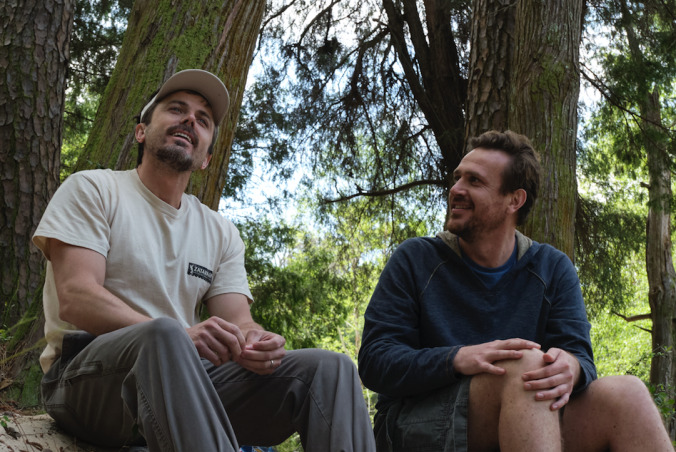Jason Segel is a rock of selflessness in the sugarcoated cancer drama Our Friend


The opening scene of Our Friend, a tender indie tearjerker built from the blueprint of a wrenching true story, finds a husband and wife on the precipice of a difficult conversation. It’s time for Nicole (Dakota Johnson) and Matt (Casey Affleck) to talk to their children. Nicole, we’ll soon learn, is sick, and though it’ll be another hour before the film reveals the specific nature of what they’ll disclose, it’s clear that the discussion won’t be an easy one. At least they have one helpful instruction from the doctors: Avoid euphemisms. Give it to them straight. Because there should be no misunderstanding about what’s coming. They have to face reality head on and together.
There’s a certain irony to this in media res prologue—one that will be clear to anyone who’s read the source material, Matthew Teague’s “The Friend: Love Is Not A Big Enough Word.” In his prizewinning essay, published in Esquire in 2015, the journalist recounts the time he spent caring for his wife after she was diagnosed with ovarian cancer, and also how his best friend, Dane Faucheux, moved in to help out during this impossible crucible for the family. It’s an unflinchingly honest memoir, candidly cataloging every ugly detail—medical and psychological—to the point where a truly faithful adaptation would be more upsetting than any horror movie released last year. Our Friend is not that film. It’s sweet and involving and occasionally even moving, but also, in its selective dramatization, a lot easier. Which is to say, it approaches the story itself rather euphemistically, handling the audience with kid gloves by eliding the most unpleasant truths of the family’s experience.
Directed by Gabriela Cowperthwaite, who pulled fewer punches in her documentary Blackfish, Our Friend doesn’t so much deviate from Teague’s account as supply it a new shape and a certain seriocomic Indiewood luster. As the title suggests, the focus is partially on Dane (Jason Segel), a close college friend of the couple who offers to come stay at their Alabama home for a few days after Nicole’s diagnosis—an arrangement that became indefinite, as those days bled into weeks and then months and then more than a year, Dane basically pausing (if not outright abandoning) his life in New Orleans to help look after their two daughters, Molly (Isabella Kai) and Evangeline (Violet McGraw). The script, by Brad Ingelsby, introduces a flashback structure, cutting away from present-day scenes of hospital visits and worsening conditions to fill in the history of a friendship en route to a medical crisis.
In his essay, Teague makes few attempts to crack or explain Dane’s sacrifice: Among other things, it’s an awed, grateful tribute to his friend’s selfless insistence on just being there through the whole gauntlet of heartache and horror. Divorced of a purely first-person perspective, Our Friend strains for understanding it doesn’t always find: One can admire its dramatic theories—the faint suggestion that Dane’s endless supportiveness stemmed partially from a desire to give more meaning to his own life, low on romantic or professional “success”—while still feeling that Segel is playing more saint than man. The flashbacks offer backstory but not a lot of extra dimension.
Segel has, of course, spent much of his career exploring the vagaries of male bonding, from the goofy-sweet Apatovian bromance of I Love You, Man to the pricklier quasi-friendship of The End Of The Tour. It’s no surprise, perhaps, that Our Friend hits its stride when centering the relationship between Dane and Matt, finding conflict at its origins (the false alarm of romantic competition) and in its margins. Affleck, too, is in his wheelhouse: Four years after his tremendous, Oscar-winning performance of crystalized guilt and grief in Manchester By The Sea, he’s playing another man numbed by unfathomable hardship. (His voice, which ranges from whisper to mutter, is uniquely suited to characters almost choked silent by their feelings.)
Yet Our Friend keeps us on the outside of that pain, never offering the kind of window into Teague’s heart and mind that his writing intrinsically could. Is this a case of a story perfected in its original format—a personal essay molded imperfectly into cinema? The film fares best when at its most specific, zeroing in on the dismaying inevitability of well-meaning friends disappearing when the going gets tough or moments of casual tragedy, like Matt taking note of what braiding is in anticipation of having to do that for his daughter. Other times, Cowperthwaite’s approach suggests an elegant yada yada: Rather than steep us in the nitty-gritty, the film often flutters through a vaguely Malickian montage of bucket-list excursions and anguished embraces.
One begins to wonder if the achronological structure is just a way to put off everything inconveniently messy in Teague’s essay, like a tough conversation it’s trying to avoid. “We don’t tell each other the truth about dying,” the author writes, early into his article. “It’s grotesque. It’s undignified.” But Our Friend spares us the gory details at almost every turn, cleaning up a story whose power stemmed, heavily, from its willingness to be gruelingly truthful about what cancer can do to the body. Cowperthwaite barely seems willing to even deglamorize Johnson, who never really loses her movie-star glow, even when her character—the most underdeveloped of the film’s trio—becomes unrecognizable to those in her life. At one point, Nicole begins wearing a wig around the house to entertain visitors, doing a performance of good health rather than let anyone see the reality of her condition. It’s as good a metaphor as any for the way Our Friend softens its own blows.